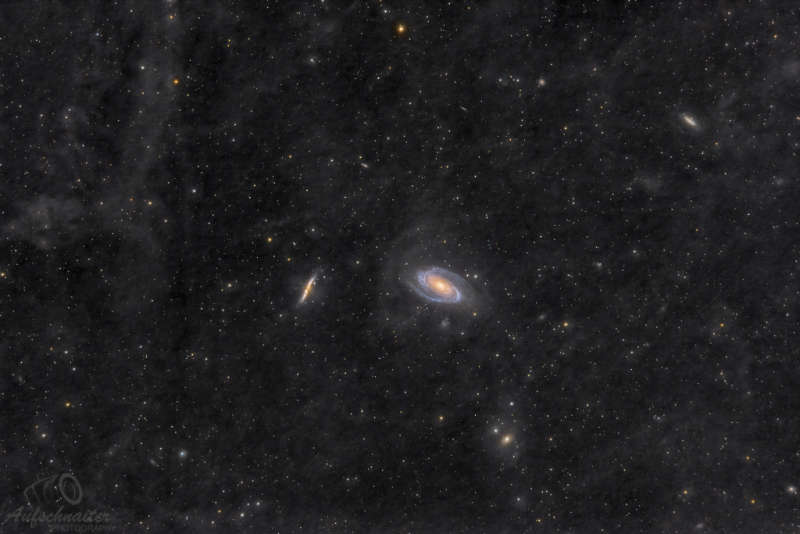Credit & Copyright: Andreas Aufschnaiter
Explanation:
The two dominant galaxies near center
are far far away, 12 million light-years distant
toward the northern constellation of the Great Bear.
On the right, with grand spiral arms and bright yellow core is
spiral galaxy M81.
Also known as Bode's galaxy, M81 spans some 100,000
light-years.
On the left is cigar-shaped
irregular galaxy M82.
The pair have been locked in gravitational combat for a billion years.
Gravity
from each galaxy has profoundly affected the other during
a series of cosmic close encounters.
Their last go-round lasted about 100 million years and
likely raised density waves rippling around
M81, resulting in the richness of
M81's
spiral arms.
M82
was left with violent star forming regions and
colliding gas clouds so energetic that the galaxy
glows in X-rays.
In the next few billion years, their
continuing gravitational encounters will result in a merger, and a
single
galaxy will remain.
This extragalactic scenario also includes other members of the interacting
M81 galaxy group
with NGC 3077 below and right of the large spiral, and
NGC 2976 at upper right in the frame.
Captured under dark night skies
in the Austrian Alps, the foreground of
the wide-field image is filled with integrated flux nebulae.
Those faint, dusty interstellar clouds
reflect starlight above the plane of our own Milky Way galaxy.
1999 2000 2001 2002 2003 2004 2005 2006 2007 2008 2009 2010 2011 2012 2013 2014 2015 2016 2017 2018 2019 2020 2021 2022 2023 2024 2025 |
Yanvar' Fevral' Mart Aprel' Mai Iyun' Iyul' Avgust Sentyabr' Oktyabr' Noyabr' Dekabr' |
NASA Web Site Statements, Warnings, and Disclaimers
NASA Official: Jay Norris. Specific rights apply.
A service of: LHEA at NASA / GSFC
& Michigan Tech. U.
|
Publikacii s klyuchevymi slovami:
colliding galaxies - vzaimodeistvuyushie galaktiki - M 81 - M 82
Publikacii so slovami: colliding galaxies - vzaimodeistvuyushie galaktiki - M 81 - M 82 | |
Sm. takzhe:
Vse publikacii na tu zhe temu >> | |
